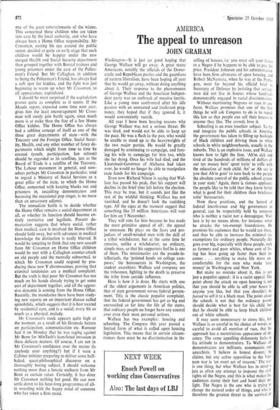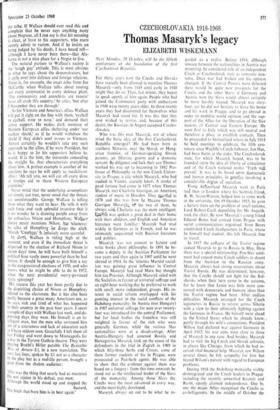The appeal to unreason
AMERICA JOHN GRAHAM
Washington—It is just no good hoping that George Wallace will go away. A great many Americans, notably the officials of the Demo- cratic and Republican parties and the guardians of eastern liberalism, have been hoping all year that he would go away, without doing anything about it. Their response to the phenomenon of George Wallace and the American Indepen- dent party was an outbreak of massive inertia. Like a young man confronted after his idle passion with an unwanted and irrelevant preg- nancy, they hoped that if they ignored it, it would conveniently vanish.
All year I have been hearing reasons why George Wallace was not a serious threat. He was tired, and would not be able to keep up the pace. He was a flash in the pan, who would be unable to stand up to the heavyweights of tfie two major parties. He would be greatly damaged by continuing to campaign, and forc- ing his wife to campaign for him too, while she lay dying. Once his wife had died, and the Lieutenant-Governor of Alabama had taken over, he would no longer be able to manipulate state funds for his campaign.
Even now Richard Nixon is saying that Wal- lace has passed his peak, that his support will decline in the brief time left before the election. This may be true, but it sounds just like the rest of the wishful thinking. Wallace has not vanished, and he doesn't look the vanishing type. All the signs at the moment suggest that something like 15 million Americans will vote for him on 5 November.
They will vote for him because he has made the most primitive appeal of all : the appeal to unreason. He plays on the fears and pre- judices of small-minded men with the skill of a tribal witchdoctor, but at "the same time he remains, unlike a witchdoctor, an ordinary, simple man, so that his supporters feel he is one of them. The missionaries are the pseudo-in- tellectuals, the 'pointed heads on college cam- puses,' the bureaucrats in Washington, the student anarchists; Wallace and company are the tribesmen, fighting to the death to preserve the tribe from outside influence.
Here is how it is done. He starts with one of the oldest arguments in American politics, that of state government versus federal govern- ment. This is the classic populist complaint, that the federal government has got so big and encroached so far into the life of the states, that ordinary people no longer have any control over even their most personal actions.
Wallace has two examples: housing and schooling. The Congress this year passed a limited form of what is called open housing legislation. This means that in certain circum- stances there must be no discrimination in the selling of houses, i.e. you must sell your house to a Negro if he happens to be able to pay the price. President Johnson and his administration have been firm advocates of open housing, and Robert McNamara, when he was at the Penta- gon, went far beyond his official brief as Secretary of Defence by insisting that service. men did not live in houses whose landlords demonstrably engaged in racial discrimination.
Without mentioning Negroes or race in any form, Wallace promises that one of the first things he will ask Congress to do is to repeal this law so that people can sell their houses to anyone they like. The crowds love it.
Schooling is an even touchier subject. To try and integrate the public schools in America, the government has taken to filling up busloads of black children and driving them to white schools in white neighbourhoods, usually in the suburbs. This is an explosive issue, and Wallace knows how to light the fuse. `Ah'm sick and tired of the hundreds of millions of dollars of our tax money bein' spent tryin' to trifle with the education of mah child. An' so Ah say to you that Ah'm goin' to turn back to the people the absolute control of the public school system in your state.' Again, there is riotous applause; the people like to be told that they know better what is good for their children than briefcase- totin' bureaucrats.
Now these positions, and the hatred of federal interference and big government in general, can be respectably held by someone who is neither a racist nor a demagogue. Wal- lace is by no means alone, for instance, when he attacks -the tax-exempt foundations. He promises his audiences that he would tax these, and thus be able to increase the minimal tax exemptions for ordinary people. Naturally this goes over big, especially with those people, such as farmers and poor whites, whose cost of liv- ing has been going up faster than their in- comes . . . anything to make life more un- comfortable for the men who make 'easy money' in Washington and New York.
But make no mistake about it, this is not just a populist appeal : it is a racist appeal. The point about the attack on open housing is not that you should be able to sell your house to anyone you like, but that you shouldn't be forced to sell it to a black man. The point about the schools is not that the ordinary parent should decide what is best for his child, but that he should be able to keep black children out of white schools.
It may seem unnecessary to stress this, but Wallace is so careful in his choice of words, so careful to avoid all mention of race, that his approach has a meretricious appearance of de- cency. The same appalling dishonesty lurks in his attitude to demonstrators. To Wallace, all demonstrators are militants, communists and anarchists. 'I believe in honest dissent,' he claims, but any active opposition to the Viet- nam war is 'an overt act of treason.' The war is one thing, but what Wallace has in mind's just as often any attempt to improve the civil rights of the Negro, and this is what makes his audiences stamp their feet and howl their de- light. The Negro is the one who is trying t0 change the natural order of things, and who Is therefore the greatest threat to the survival of the tribe. If Wallace should ever read this and complain that he never says anything nasty about Negroes, all I can say is that his meaning is clear, at least to his supporters, who more openly admit to racism. And if he insists on being judged by his deeds, I have heard tell— although I have never been there—that Ala- bama is not a nice place for a Negro to live.
The natural partner to Wallace's racism is the 'tough guy' attitude. This is most obvious in what he says about the demonstrators, but it spills over into defence and foreign relations. There is, for example, the exact echo from Joe McCarthy when Wallace talks about rooting out every communist in every defence plant. `The communists and anarchists are runnin' loose all ovah this country,' he cries, 'but after 5 November they are through.'
As for Vietnam and America's allies, Wallace will put it right on the line with them, 'eyeball to eyeball, nose to nose,' and demand their active support. He makes dark mention of Western European allies sheltering under 'our nuclear shield,' as if he would withdraw the shield if they didn't send troops to Vietnam. Almost certainly he wouldn't take any such approach to the allies, if he were President, but he is happy to let his supporters believe he would. It is the hint, the innuendo concealing the straight lie, that characterises everything about him. A perfect example is another of the sanctions he says he will apply to recalcitrant allies: `Ah tell you, we will cut off every dime of foreign aid to those Western European countries.'
Never mind that the underlying assumptions are simply not true, never mind that the threats are unenforceable. George Wallace is telling them what they want to hear. He tells it with such force and such splendid invective that it is no wonder he is drawing people away from the colourless Nixon and Humphrey. Wallace- almost never mentions Nikon, iNt 'Whenever he talks of Humphrey ;le drops the aitch. `Mistah 'Umpliev' IS Infinitely more scornful.
IR allissri, Wallace is riding high at the moment, and even if the immediate threat is dispersed by the election of Richard Nixon in eleven days' time, he will have built himself a political base vastly more powerful than he had before. It should be enough to give him a say in the congressional elections of 1970, and who knows what he might be able to do in 1972, when the next presidential merry-go-round starts spinning?
His success this year has been partly due to the dispiriting choice of Nixon or Humphrey offered to the electorate. But it has also been partly because a great many Americans are, as he says, sick and tired of what has happened to their country in the past four years. I spent a couple of days with Wallace last week, and de- pressing days they were. He himself is an in- telligent man, but the men who surround him are of a coarseness and lack of education such as I have seldom seen. Gratefully I left them all last Friday and went down to Minneapolis for a day in the Tyrone Guthrie theatre. They were Playing Brecht's Hitler parable The Resistible Rise of Arturo Ui, in a new translation. The very last lines, spoken by Ui not as a character in the play but as a real-life person, brought a gasp from the shaken audience: `This was the thing that nearly had us mastered Do not rejoice in his defeat, yoit men; Although the world stood up and stopped the bastard, The bitch that bore him is in heat again.'















































 Previous page
Previous page